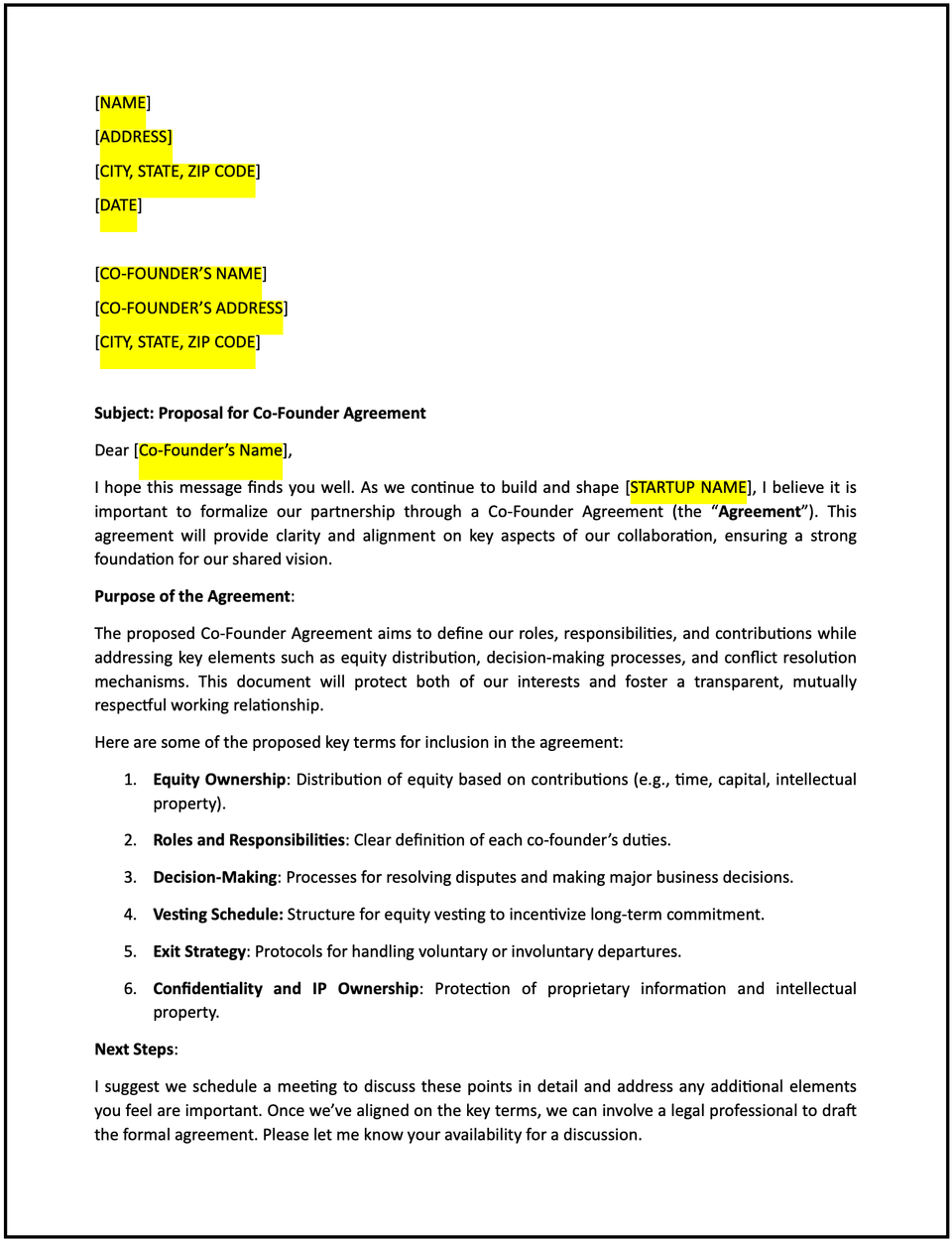Letter of proposal for co-founder agreement: Free template

Letter of proposal for co-founder agreement
A letter of proposal for a co-founder agreement is a formal communication used to propose terms and conditions for a working relationship between co-founders. This letter outlines roles, responsibilities, equity distribution, decision-making processes, and other key aspects to establish a clear, mutually beneficial foundation.
How to use this letter of proposal for co-founder agreement
- Open with an introduction: Address the recipient respectfully and acknowledge the importance of formalizing the co-founder relationship.
- State the purpose: Clearly communicate your intent to propose terms for a co-founder agreement.
- Highlight key areas: Outline the main components of the agreement, such as roles, equity, decision-making, contributions, and exit clauses.
- Emphasize mutual benefits: Explain how the agreement ensures alignment, fairness, and a solid foundation for growth.
- Invite collaboration: Encourage the recipient to provide feedback, suggest changes, or raise concerns to tailor the agreement further.
- Suggest next steps: Propose scheduling a meeting or call to review the proposed terms in detail.
- Maintain a professional tone: Ensure the letter is clear, respectful, and focused on fostering a constructive discussion.
- Provide contact information: Include details for the recipient to reach out with questions or to arrange a discussion.
Benefits of using a letter of proposal for co-founder agreement
This letter ensures a structured and professional way to initiate discussions about formalizing a co-founder relationship. Here’s how it helps:
- Promotes clarity: Outlining key terms ensures both parties understand their roles and expectations.
- Reflects professionalism: A well-crafted letter demonstrates respect and a commitment to a strong partnership.
- Encourages alignment: Establishing agreement terms fosters collaboration and shared goals.
- Prevents disputes: Clearly defined roles and responsibilities reduce the potential for conflicts.
- Builds trust: Proactively proposing a fair and comprehensive agreement strengthens the relationship.
Tips for writing an effective letter of proposal for co-founder agreement
- Be specific: Clearly outline the proposed terms and their significance to the partnership.
- Use professional language: Maintain a respectful and constructive tone to foster collaboration.
- Provide context: Briefly explain the purpose of the agreement and its importance for the venture.
- Highlight mutual benefits: Emphasize how the agreement ensures fairness and supports shared goals.
- Include actionable steps: Share clear instructions for reviewing the terms and scheduling a follow-up discussion.
- Keep it concise: Focus on the essential points while ensuring the tone is professional and engaging.
Frequently asked questions (FAQs)
Q: What details should I include in this letter?
A: Include roles, equity distribution, decision-making processes, financial contributions, and dispute resolution terms.
Q: Should I personalize the letter?
A: Yes, addressing the recipient by name and referencing their specific contributions demonstrates attentiveness and respect.
Q: Who typically sends this letter?
A: Founders initiating the co-founder relationship or legal advisors drafting the terms typically send this letter.
Q: How formal should this letter be?
A: The tone should be professional, respectful, and collaborative to encourage constructive discussion.
Q: When should this letter be sent?
A: Send the letter before significant milestones, such as fundraising or product launches, to ensure alignment early.
Q: Can this letter include a draft agreement?
A: Yes, attaching a draft agreement provides a starting point for discussions and feedback.
Q: Is acknowledgment from the recipient required?
A: While not mandatory, requesting acknowledgment ensures the recipient is aligned with the proposed next steps.
This article contains general legal information and does not contain legal advice. Cobrief is not a law firm or a substitute for an attorney or law firm. The law is complex and changes often. For legal advice, please ask a lawyer.


